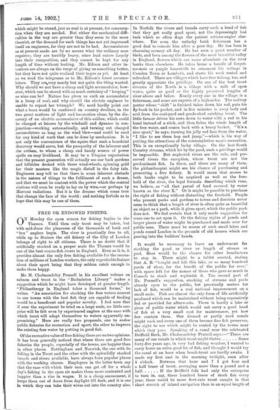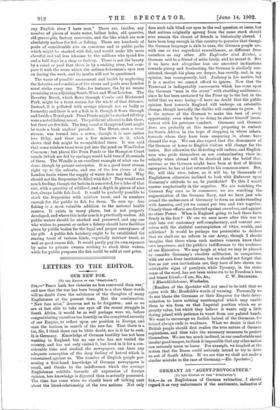FREE OR ENDOWED FISHING.
ON Monday the open season for fishing begins in the Thames. Until then only trout may be taken, but with mid-Jane the pleasures of the thousands of bank and "box" anglers begin. The river is practically free to all, while up to Staines the old fishery of the City of London belongs of right to all citizens. There is no doubt that if artificially stocked on a proper scale the Thames would be one of the best coarse-fish rivers in England. Even as it is, it provides almost the only free fishing available for the recrea- tion of millions of London workers, the only regrettable feature about their sport being that they seldom catch enough to make them happy.
Mr. H. Cholmondeley Pennell in his excellent volume on salmon and trout in the "Badminton Library" makes a suggestion which he might have developed at greater length. "Philanthropy in England takes a thousand forms," he writes. "An association for stocking the free waters nearest to our towns with the best fish they are capable of feeding would be a beneficent and popular novelty. I feel sure that if ever the experiment be tried on a large scale, no little sur- prise will be felt even by experienced anglers at the ease with which trout will adapt themselves to waters apparently un- promising." Here are really two proposals, one to endow public fisheries for recreation and sport, the other to improve the existing free water by putting in good fish.
Of the recreative value of free fishing there are no two opinions. It has been generally noticed that where there are good free fisheries the people, especially of the towns, are happier than in other places. Nottingham and Norwich, the one with its fishing in the Trent and the other with the splendidly stocked broads and rivers available, have always been popular places with the working classes. Employers in the latter town say that the ease with which their men can get off for a whole day's fishing in the open air makes them more contented and happier than a rise in wages. It is a cheap amusement, it keeps them out of doors from daylight till dark, and it is one in which they can take their wives out into the country also.
In Norfolk the rivers and broads carry such a head of fish that they get really good sport, not the depressingly bad luck which so often dogs the patient artisan-angler else- where. Yet even the unlucky bank fisherman has a good deal to console him after a poor day. He has been in charming scenery all day. He has seen a great number of birds, and been among the flowers of the most beautiful valley in England, flowers which are more abundant on the river banks than elsewhere. He takes home a bundle of forget- me-nots or purple loosestrife to ornament his cottage in Camden Town or Lambeth, and starts his week rested and refreshed. There are villages which have free fishing, too, and greatly appreciate the privilege. On one of the best trout streams of the North is a village with a mile of open water, quite as good as the highly preserved lengths of river above and below. Nearly every one in the village is a, fisherman, and some are experts of a high order. The railway porter whose "shift" is finished takes down his rod, puts his fly-book in his pocket, and in five minutes is away body and soul from the coal-yard and goods-shed catching trout. The little farmer drives his cows down to water with a rod in his hand instead of a stick, and then fishes the whole length of the free water, and comes back with a heavy basket. "It's a nice sport," he says, turning his jolly red face from the water. "I like to see them hop and jump,"—which is his way of putting the attractions of the contemplative man's recreation. This is an exceptionally lucky village. On the best South Country streams, which let by the yard, such a privilege would be impossible. But neglected rivers are the rule, and pre- served rivers the exception, where trout are not the predominant fish. In these, and there are many of them, the philanthropist might see his chance of purchasing and presenting a free fishery. It would mean that access to both banks ought to be acquired as well as the free- hold of the river, the legal formula describing which runs, we believe, as "all that parcel of land covered by water known as the river X." Or it might be possible to purchase the right of fishing without disturbing the freehold. People who present parks and gardens to towns and districts never seem to think that a length of river is often quite as beautiful an object as a park, while it gives sport, which the public park does not. We feel certain that it only needs suggestion for some one to act upon it. Or the fishing rights of ponds and larger pieces of water might be purchased and made over for public uses. There must be scores of such small lakes and ponds round London in the grounds of old houses which are passing into the builders' hands.
It would be necessary to leave an endowment for stocking the pond or river or length of stream or pool. Here would be the chance for other benefactors to step in. There might be a tablet erected, stating that A. B. "bought and left this lake, or so many hundred yards of river, for the benefit of the public for ever," with space left for the names of those who gave so much in Consols to stock and replenish it. The second part of Mr. Pennell's suggestion, stocking of streams and pools already open to the public, but practically useless for lack of fish, would be a real national improvement on a small scale. Fish are almost the only form of life artificially produced which can be maintained without being expensively fed or provided for afterwards. There is hardly a lake or piece of public water which would not carry a good head of fish at a very small cost for maintenance, yet how few contain them. Our disused or partly used canals might each and every one of them become fine fish preserves, the right to use which might be rented by the towns near which they pass. Speaking of a canal near the celebrated Driffield Beck, Mr. Cholmondeley Pennell says :—" There are
many of our canals in which trout might thrive Some forty-five years ago, in very bad fishing weather, I wanted to carry home an extra good lot of fish, and thought I would try the canal at an hour when brook-trout are hardly awake. I made my first cast in the morning twilight, soon after 4 o'clock. Between that hour and 7 I got four and a half brace of trout, averaging more than a pound and a
half If the Driffield folk had only the enterprise to turn in, say, three hundred brace of stock fish every year, there would be more first-rate trout caught in that short stretch of inland navigation than in an equal length of any English river I have seen." There are, besides, any number of pieces of waste water, ballast holes, old quarries, old gravel-pits, factory reservoirs, and the like which are now absolutely useless for fish or fishing. There are hundreds of pools of considerable size on commons and in public parks which might be stocked with fish, and would make life more cheerful and toil less irksome to the millions who spend five and a half days in a shop or factory. There is not the beauty by a canal or pool that there is by a rushing river, but com- pare it with the scene which the artisan-fisherman's eyes rest on during the week, and its merits will not be questioned.
The waste of possible amusement and health by neglecting the fisheries and condition of the rivers and pools near London must strike every one. Take, for instance, the by no means promising area adjoining South-West and West London. The Beverley Brook, which flows through Cmnbe and Richmond Park, might be a trout stream for the whole of that distance. Instead, it is polluted with sewage (though not so badly as formerly) and there is not a fish in it, though it flows through and beside a Royal park. Penn Ponds might be stocked till they were a noted fishing resort. The public arc allowed to fish there, but there are few fish. The long canal at Hampton Court might be made a bank anglers' paradise. The Brent, once a trout stream, was turned into a sewer, though it is now rather less filthy, and there are a few minnows in it, which shows that fish might be re-established there. It was said that some rainbow trout were put into the pond on Wimbledon Common; but places like Penn Ponds or the Hampton Court canals (which are fed by springs) would hold tens of thousands of them. The Wandle is an excellent example of what can be done, though by private enterprise. It is a good trout stream right up to the suburbs, and one of the few rivers of the London basin where the supply of water does not fail. Why should not the Serpentine be filled with fish ? They would need much feeding, though the bottom is concreted, for a lake of that size, with a quantity of wildfowl, and a depth in places of nine feet., always holds fish food. It would be perfectly possible to stock the Serpentine with rainbow trout, and in numbers enough for the public to fish for them. To sum up: free fishing is a most valuable addition to the national health reserve. It exists in many places, but is not properly developed, and where this is the case it is practically useless. All public waters should be stocked and preserved, and any one who wishes to present or endow a fishery should have facilities given by public bodies for the legal and proper conveyance of the gift. A public fish hatchery ought to be established for rearing trout of various kinds, especially rainbow trout, as well as good coarse fish. It would partly pay its own expenses by sales to private owners wishing to stock their waters, while for public purposes the fish could be sold at cost price.











































 Previous page
Previous page